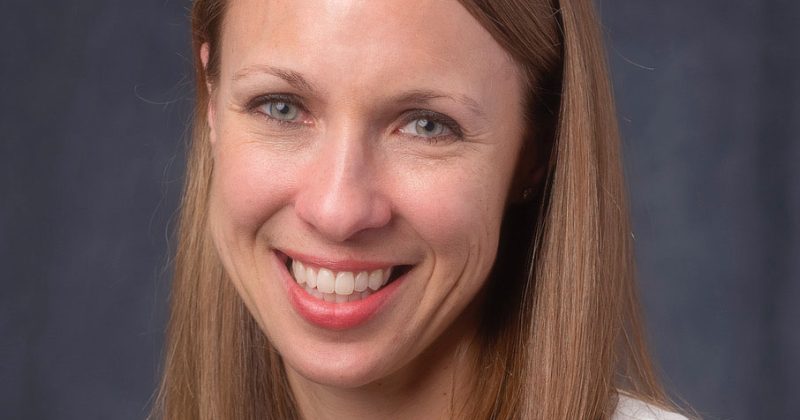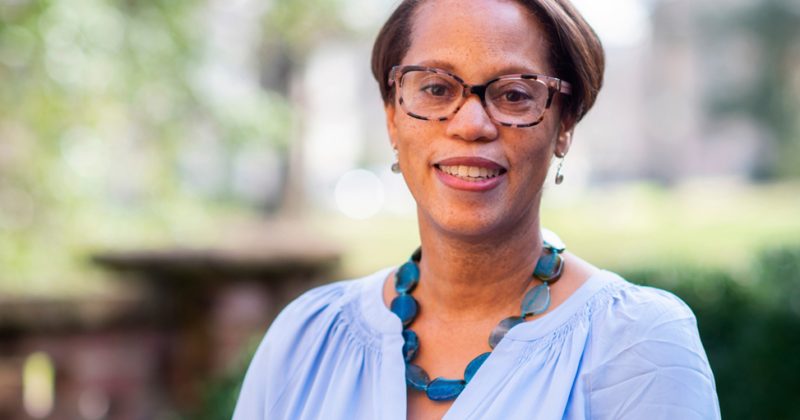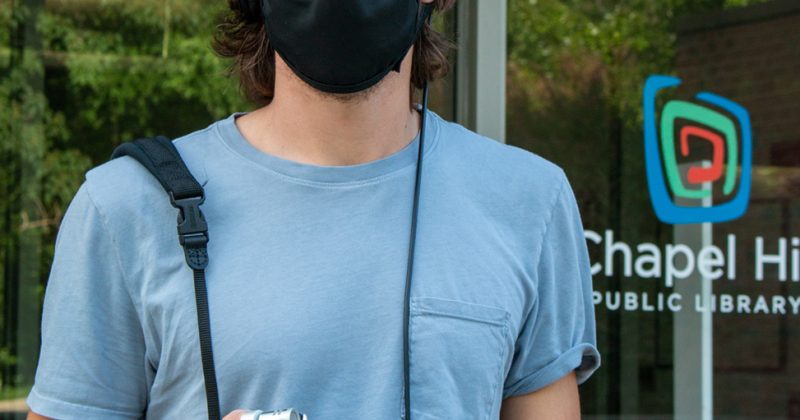
A photographer captures an abstract, futuristic photo of downtown Chapel Hill. Southern Futures is a sweeping cross-campus initiative that recognizes the diverse and changing voices of the South. (photo by Donn Young)
Southern Futures is a new campuswide initiative that supports cutting-edge scholarship, creative endeavors and thoughtful conversations across disciplines, in partnership with the Center for the Study of the American South, the College of Arts & Sciences, Carolina Performing Arts, University Libraries and Southern communities. Its mission is to “Reimagine the American South.”
We chatted about the initiative with co-directors Malinda Maynor Lowery, history professor and director of CSAS, and Elizabeth Engelhardt, senior associate dean for fine arts and humanities and John Shelton Reed Distinguished Professor of Southern Studies. The scholars say they are guided by three foundational goals: Develop future Southern leaders. Focus on art, music and storytelling. Gather and share Carolina’s resources.
Learn more about Southern Futures.
Tell us about Southern Futures and its mission to “Reimagine the American South.”
Lowery: Southern Futures is meaningful because of UNC’s relationship to the region and our mission as a public university. There is no better institution in the country to tell the complex stories of the South and to be a resource and partner for communities in finding solutions to their unique challenges. We knew this effort had to be multidisciplinary, and it had to involve emerging scholars. Those three pillars, or goals, emerged out of concrete conversations over what we could do that would have a lasting impact on the South.
Engelhardt: One of the things that’s so important to me is we know the South has been an amazing engine for creativity — art, food, music and new forms of expression for people finding a voice when everything around them encourages them not to have a voice. Yet we haven’t been so good at using that incredible engine to try and solve problems or have conversations around some of the persistent challenges of the South. Southern Futures is trying to do both of those things. We have the energy and commitment here at UNC to do that, and to do it in a way that is community-focused and community-driven.
Why is the “futures” part of Southern Futures so important?
Lowery: When you get away from categorizing the South as a bad place or a good place, you quickly begin to understand that the creativity that people have used to move this place forward is a model for what people all over the world need. In particular, our climate change work (see related story on a new Mellon-funded project in Robeson County) has spoken to me about the need for relationships to one another and to the planet. In the South, there’s a willingness to deal with and reckon with each other without fleeing. We have solutions for the future and not just a way of understanding the past.
Engelhardt: For me it is important that “Futures” is plural — Futures in the plural carries an ethical imperative. It’s a project to make space for many people who have been here all along, who continue to be here and who see each other.
The initiative provides financial support for students doing publicly engaged work on issues facing the South. Why is this key?
Lowery: It has to do with nurturing and amplifying individuals who reflect the diverse and changing nature of the region. These young scholars are really going to make the future what it will be, and they have the ability to enact positive change.
Engelhardt: Students come here with stories, and one of the things the College of Arts & Sciences does so profoundly is to say “You are an original researcher from the moment you come here.” Students blow me away with the questions they ask, the research they do and the stories they can tell. We want to support them in doing that work.
You are both from North Carolina; how do your roots inform your scholarly interests? (Lowery was born in Lumberton and raised in Durham; Engelhardt was raised in Hendersonville).
Lowery: My ancestors have been in North Carolina for 13,000 years. Yet, while that speaks to a certain significance about the past, one of the things I’ve learned by doing Native American history is that Native people are not people of the past. They live in the present and are thinking about the future. There’s an intuitive way that I’ve learned over the years of expressing why the past matters. It’s about your roots, understanding your own root system. If your community is the tree, those roots have everything to do with how you’re going to keep growing. We have to nurture those roots.
Engelhardt: Two of the smartest people I knew growing up were my godmother, Imogene Eaker, and the father of my best friend, Earl Norwood. Mr. Norwood received his GED and had an incredibly successful career. He was part of the vision that would ultimately become Blue Ridge Community College. Imogene got her GED when her daughter began high school, and then she and her daughter started Brevard College together. Both of these people from my hometown insisted that knowledge is important, the world is important, words are important — but it’s also important that you are able to talk about these things in plain language. I care about not locking those stories behind the walls of a university.
Lowery: This really speaks to me of the organic intellectuals that are present in communities. One of the things we wanted to do with Southern Futures is make sure those organic intellectuals are always in the conversations, and often at the very center of the conversations, because they are so attuned to their environment and communities.
Engelhardt: It’s an idea that has transformative power not just in North Carolina or the South but all over the globe.
Southern Futures launched a podcast this past summer, where the host talks about creating a place for “distinctive storytelling and humble listening.” What are your goals in reaching listeners through this medium?
Engelhardt: We had wanted to do something like a podcast from the very early days of Southern Futures. This is the place to talk about that “humble listening.” One of the most important conversations we had was: Can we create a podcast with some silences? It’s not about a speech or a finished published work; it’s about coming together and thinking things through together and having a conversation. Doing a podcast in the moment of COVID-19 is a way for us to remember and help strengthen those connections between communities.
Lowery: One of the very first, possibly the first, sensory experiences we have other than touch is hearing and sound. So being able to elevate a medium that emphasized listening — it felt like the most authentic way we could talk about the initiative.
Why are the partnerships with University Libraries, Carolina Performing Arts and other campus units critical to the work?
Engelhardt: The partnerships are important because we make each other better. What we are proposing with Southern Futures is that we make each other better if we begin the partnership early on. This is not the arts-as-translational at the very end of the research project. It’s actually about how we can help define the project, and that comes from the humble listening.
How is COVID-19 affecting your work?
Lowery: The COVID-19 crisis has focused attention on core questions about the future of our state and our region — questions that Southern Futures is designed to explore. We want people to see communities as having the resources and the assets to solve their own problems.
We will be working with The Graduate School at UNC through funding from the N.C. Policy Collaboratory on a new project — building out a National Science Foundation framework to train students to be “boundary spanners.” Boundary Spanner Scholars will use humanistic and data analysis tools to support teams addressing COVID-19-related concerns in North Carolina communities. Southern Futures’ approaches are essential to this collaboration.
Interview by Kim Weaver Spurr ’88
Read more about the work that Carolina students, faculty and alumni are doing as part of Southern Futures.
Southern Futures: Exploring intersections of class and race in Green Valley
Southern Futures: Vulnerable lives on the Matanzas River
Southern Futures: Cultural activism and the fate of Johns Island
Southern Futures: Voices of resilience and recovery in Robeson County
Southern Futures: Chief Hope Officer
Poet Tyree Daye was featured in a Southern Futures podcast.
Published in the Fall 2020 issue | Features
Read More

Treul, Marinelli to lead Program for Public Discourse
Sarah Treul and Kevin Marinelli have been tapped to lead…

Black Towns, Black Futures
Anthropologist Karla Slocum focuses on the historic and contemporary significance…


